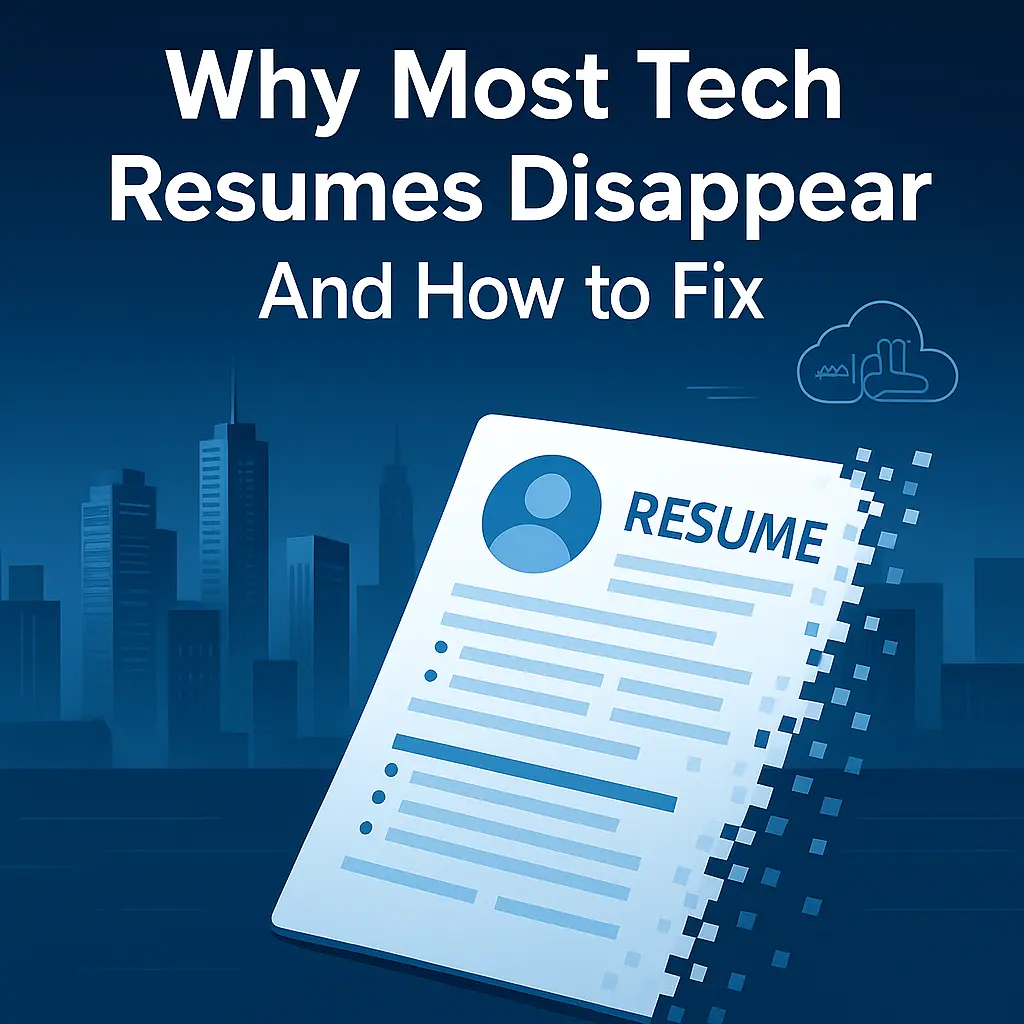If your inbox stays silent after sending out countless job applications, it’s easy to blame the job market, the ATS systems, or recruiters.
But the truth often hits closer to home: you might be underselling yourself, and you probably don’t even know it.
Most candidates assume their resume speaks for itself, but it barely whispers your real value. The right story needs to be told clearly and confidently for recruiters to say,
“We need to talk to this person.”
Many career experts are gatekeeping the proper way of resume writing, tightly. Here, you’ll get those insider secrets to stop underselling yourself and start getting interviews.
Why Your Resume Isn’t Getting You Interviews
It’s more than just formatting.
A lot goes into resume writing.
Many candidates believe that a sleek resume template, perfect grammar, and some quantification is enough.
Yes, your resume should be free from typos and errors, especially when stating your facts and contact info. But underselling value goes beyond appearances.
Career experts point out the most common hidden flaws that hold candidates back:
- Listing tasks instead of impactful outcomes or achievements. A resume full of “responsible for” and “helped with” signals passivity rather than achievement.
- Avoiding strong, confident language to not sound arrogant, which actually dilutes your impact. Bragging is good. But make it a point you don’t across as arrogant, and most importantly you have to present facts or evidence to back your claims.
- Burying your top skills and achievements deep in bullet lists where recruiters might never see them. Don’t do that. It should be right up where it’s easy to see and scan, mostly on the top part.
- Neglecting the power of tailoring each resume to speak directly to the job description keywords and company values. Your resume is drier than the Atacama Desert, that sounds like a robot. Auto-reject.
You see, these are just the tip of the iceberg. We’ll uncover more as we go deeper, to the roots.
📌Still not getting interviews? Cut to the chase, use this Free resume builder to land interviews fast.
How to Know If You’re Underselling Yourself
Our career expert reveal the top signs and here’s what many professionals won’t tell you openly.
If your resume looks fine but you're still not landing interviews, there's a high chance you're not showing your full value. Show results, be confident, and tailor it then watch the doors open.
Underselling yourself doesn't mean you lack experience. It often means you're not presenting your skills and impact in a way that resonates with employers.
Here are the most common signs you're underselling yourself:
- You describe tasks, not outcomes.
- Your resume sounds generic and could apply to anyone in your field.
- You avoid strong, confident language to avoid sounding arrogant.
- Your key achievements are hidden halfway down the page.
- You haven’t updated your resume to reflect recent wins.
- You downplay leadership roles or solo accomplishments.
- You’re being paid less than others with similar roles and experience.
- You accept offers without negotiating salary or title.
- You feel awkward writing about your strengths.
- You copy job descriptions instead of highlighting personal impact.
- You use vague terms like "helped" or "supported" without showing results.
- You aim to sound humble but end up sounding unsure.
When your resume doesn't confidently communicate what you bring to the table, it doesn't just slow down your job search. It weakens how you're perceived by employers.
📌Build a tailored, optimized resume with expert-backed tools that highlight your real value. Try the free resume builder that gets results.
The Secret Career Experts Don’t Share: Market Yourself Like a Brand
Most job seekers treat resumes like checklists, but career strategists know it’s your personal brand statement on paper. Your resume should tell a story of progression, impact, and future potential, not just a list of duties.
You need start doing this:
- Use active, outcome-focused language that shows how you solve problems and add value.
- Incorporate industry keywords naturally to beat ATS but also resonate with hiring managers.
- Position yourself as a solution to their pain points, not just a candidate with a job history job responsibilities. First of all, your resume is not a checklist.
- Highlight transferable skills and soft skills with examples, not just buzzwords.
📌Learn how to present your skills. What Skills Should I Put on My Resume? This is how you put your best foot forward.
Unique, Unheard Advice: Expert Tips You Won’t Find Anywhere Else
Here’s where I’m sharing the career experts’ best-kept secrets. These tactics aren’t talked about much but will instantly elevate your resume game:
- Frame challenges as opportunities: Instead of saying “managed a failing project,” say “revived a stalled project by implementing X, resulting in Y.” This shows problem-solving mindset.
Before (the weak version):
Managed a failing project with multiple missed deadlines and low team morale.
After (strong, problem-solving version): Revived a stalled product launch by restructuring the project timeline, introducing weekly sprint reviews, and reassigning roles based on team strengths, resulting in a 30% faster delivery and a 15% increase in cross-team collaboration.
You see the difference? But just a reminder: this is just a template, don’t copy word by word, always reframe yours to be authentic. Also, only add statistics if you have real data backing it.
- Use micro-stories in bullet points: Add context to your accomplishments briefly but vividly,
For example: “Reduced customer churn by 15% within six months through personalized outreach strategy.” - Balance humility with confidence by quantifying contributions and using “we” carefully: Instead of “we increased sales,” say “Led a team that increased sales by 20%.” It shows leadership while giving credit, unless you did it yourself. Definitely, that’s where we use the “I”.
- Strategically omit less relevant jobs or compress them: Experts say it’s better to leave off outdated or irrelevant roles rather than clutter your resume. Focus on what sells you best.
- Leverage testimonials and LinkedIn endorsements by incorporating key phrases into your resume: This is a subtle way to reflect social proof without adding a section.
How to Use AI and Human Touch to Make Your Resume Unstoppable
You’ve probably heard about AI resume builders, but many don’t know how to combine them with human insight. Experts say AI can speed up customization and keyword optimization, but only a human can add context, tone, and strategic framing. Here’s what to do:
- Use AI tools to generate tailored versions for each job but always review and personalize the language to reflect your voice.
- Avoid generic templates that look pretty but are ATS traps. Instead, use free AI resume builders like Jobsolv, that tailor content dynamically.
- Combine AI insights with honest self-reflection on your achievements. Write your story, then use AI to polish and optimize.
AI is your friend here not a foe. We provide you with the best resources for your job search from strategic advices, tips to free tools to land interviews.
📌Here’s a deeper look at how the collaboration between AI and humans creates the powerful combination you need for a successful job search.
Critical Mistakes That Kill Interview Chances
What to stop doing right now?
- This we all know: stop using vague adjectives without backing them up. Hiring managers want proof, not fluff.
- We keep on emphasizing this: stop submitting the same resume for every application. Customization is key.
- Stop relying on fancy fonts, graphics, or photos, they confuse ATS and recruiters alike. For more guidance, see Stop Using Fancy Resume Fonts: Avoid ATS Rejection and Don’t Add Photos on Your Resume the ATS Will Reject It
- Stop thinking that just applying widely works. Quality beats quantity. For more on why recruiters flag mass applications, check Why Recruiters Flag Mass Job Applications and How to Avoid It
- Avoid overdesigned templates that doesn’t even have enough room for editing or flexibility; ATS hates them. Read Why You Should Stop Using Resume Templates
FAQs About Underselling Yourself on Your Resume
Q: How do I know if I'm underselling myself on my resume?
If your resume lists tasks instead of accomplishments, avoids confident language, or hides key achievements below the fold, you're likely underselling your value.
Q: What’s the difference between listing responsibilities and showcasing achievements?
Responsibilities say what you did. Achievements show the result. For example, instead of "handled customer complaints," say "resolved 95% of customer complaints within 24 hours, improving retention."
Q: Why am I not getting interviews even though I'm qualified?
Chances are your resume isn’t effectively marketing your impact or aligning with the job description. Recruiters need to see relevance and results, not just responsibilities.
Q: How do I confidently talk about my strengths without sounding arrogant?
Use strong, active language backed by facts or results. Quantify impact and highlight outcomes. Confidence comes from clarity, not exaggeration.
Q: Should I tailor my resume for every job application?
Yes, tailoring your resume with job-specific keywords and value statements significantly increases your chances of passing ATS and catching a recruiter’s eye.
Q: Can AI resume builders help me stop underselling myself?
Absolutely, especially when combined with human insight. AI tools can optimize keywords and structure, while you add tone and authenticity to tell your story.
Q: What are some resume phrases that make me sound passive?
Avoid vague terms like "helped with," "supported," or "responsible for." Instead, use active verbs like "led," "increased," "revamped," or "executed."
Q: Where should I place my top skills and achievements on my resume?
Put your strongest skills and results near the top third of your resume, as that’s the area recruiters scan first. Don’t bury your wins.
Q: How do I write about soft skills without sounding generic?
Show them through results. Instead of saying “great communicator,” write “improved cross-departmental collaboration through weekly strategy syncs.”
Q: Is it okay to remove older or irrelevant jobs from my resume?
Yes. Career experts recommend omitting outdated or irrelevant roles to keep your resume focused, concise, and tailored to your current goals.
Final Thoughts: Start Telling What You Bring to the Table
Underselling yourself on your resume is more common than you think, but it's something you can change. When you present your strengths with clarity, highlight real results, and tailor each application to the role, you're more likely to get noticed.
Here’s the reality:
Today’s job market favors clear communication and confidence over modesty.
So, think of your resume as a reflection of your professional story, not just a list of roles.
If you're ready to show your true value and move forward in your job search, a tool like Jobsolv can help you build a stronger, more focused resume that gets results.
📌Take the next step: Use Jobsolv to create a resume that gets seen and gets interviews.
.svg)


















